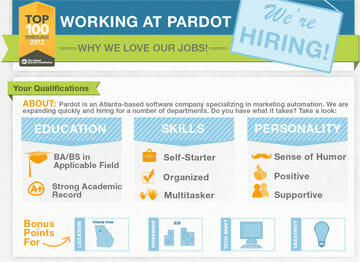
Oftentimes, I hear people in management say things like, “I wish I had more workers just like [insert name here].” That’s a great compliment of the worker, but what it should be is a wakeup call for those doing the hiring. Chances are, the rest of the employees on staff are either the wrong people for the job, or they’re just not getting what they need to really excel in their positions.
In the first instance, the solution is pretty simple to figure out. Get rid of the wrong fit. For us, one bad apple working in a results-only company can really gum up the works. And the problem is pretty much immediately apparent. But no matter how long it takes to weed out the issue, someone who’s not self-motivated isn’t likely to change. So, okay. That’s the harsh truth, there. But in other instances, it’s not the person who isn’t pulling their weight, it’s their mentors. I use that word (mentors) because 1) my boss hates being called anything close to “boss” and 2) it’s really the job of management to set goals and provide their people with the resources need to get the job done.
One thing that I’ve learned in my time at Ripple is that the goal of management shouldn’t be keeping their people on task (that’s something the right hire will do on their own), but instead encouraging them in their work and offering suggestions on to how overcome obstacles when they arise. The impulse to want to do the job for them can be great for managers and owners who are used to doing double duty. They may in fact have been doing the job before deciding to hire someone. But as Pardot’s David Cummings said to me recently, and I’m paraphrasing here, “focus on what is core and outsource everything else.” That applies to companies hiring a dedicated IT service provider, as well as to managers and owners giving their people enough room to take on, tackle, and do a victory dance over the assigned tasks.
It’s possible that the person hired may fail the first time they set out to do something wholly on their own. But without the opportunity to do so, it will never be known if they’re the right fit for the job. Owners and managers may see that failure as a reflection on themselves., since they did the hiring. To a point that’s true, but people need to fail in order to understand what works and what falls flat.. workers and owners included. Giving people the freedom to succeed or fail is what will ultimately prove their worth. If the results are less than successful, take a step back and think about whether their failure is a product of poor guidance, or simply a lack of skills and motivation. Either way, it’s the job of the mentors and decision makers to correct that by either offering a helping hand, or booting the bad egg. After all, there’s no shame in admitting to a mistake, so long as it’s one that isn’t repeated.
Don't Fall Behind!
Get the latest work-from-home and Humans First® IT tips straight to your inbox.